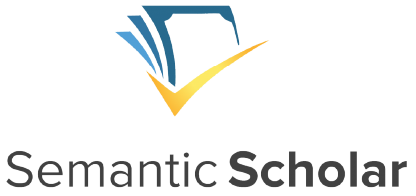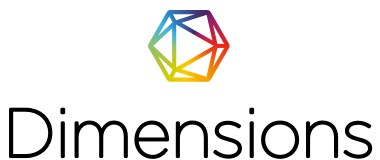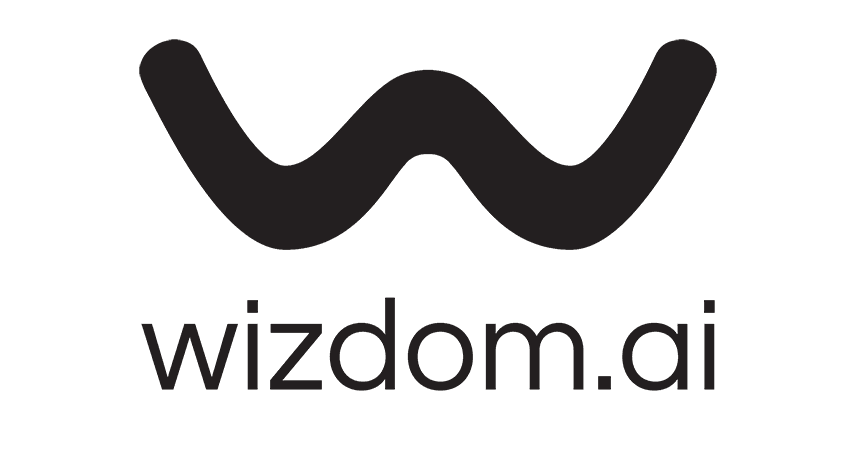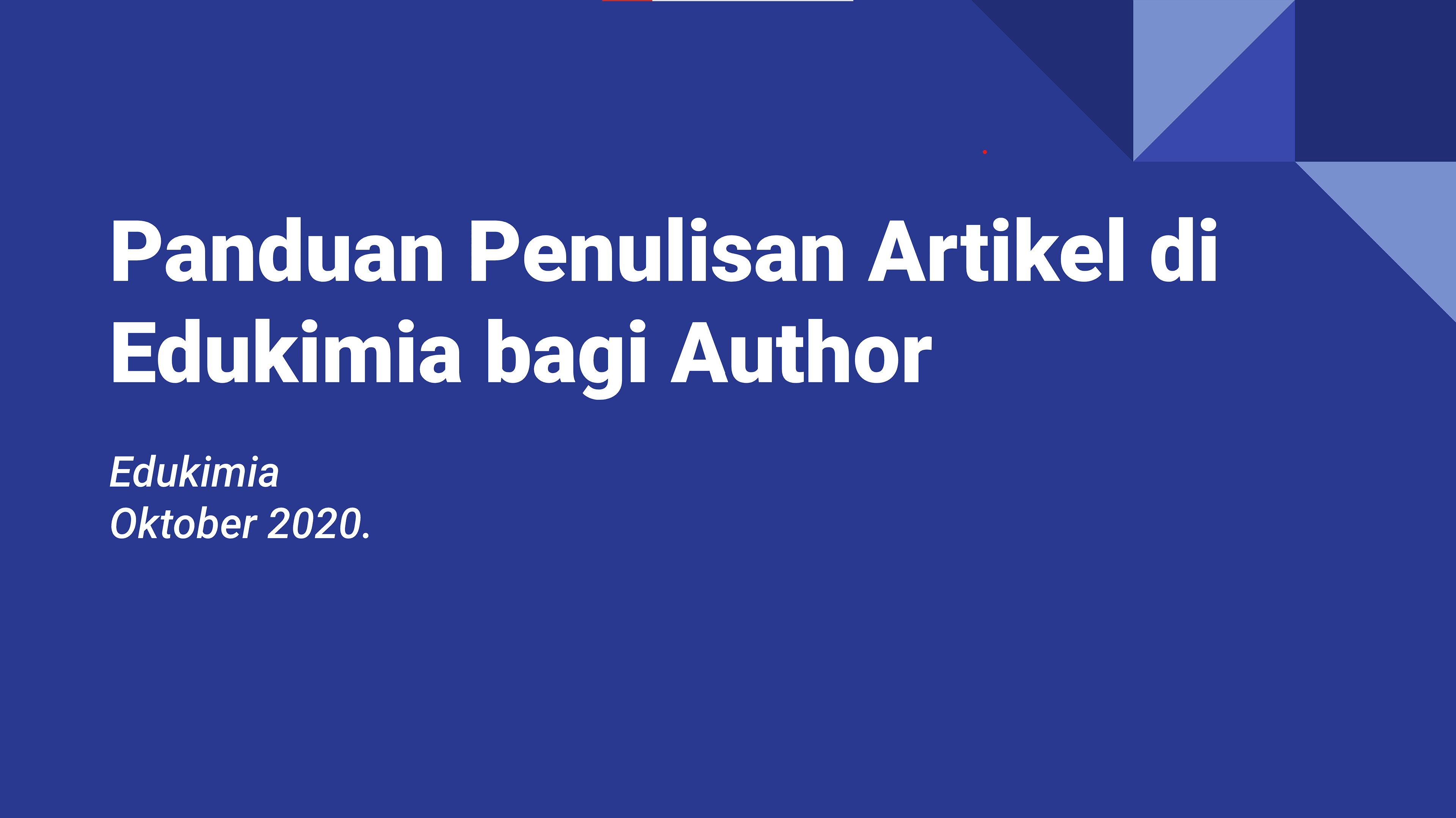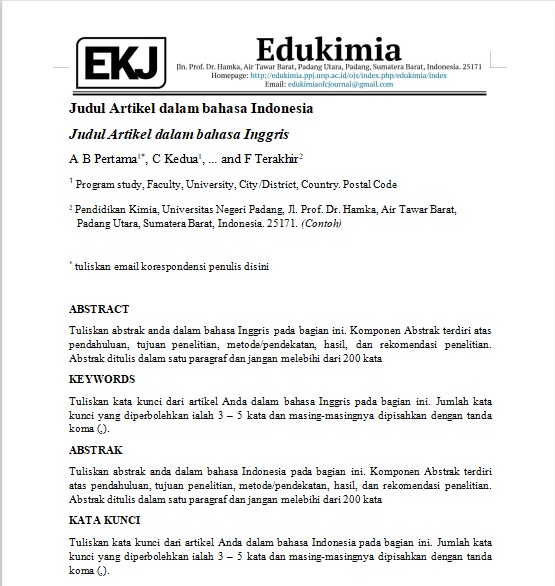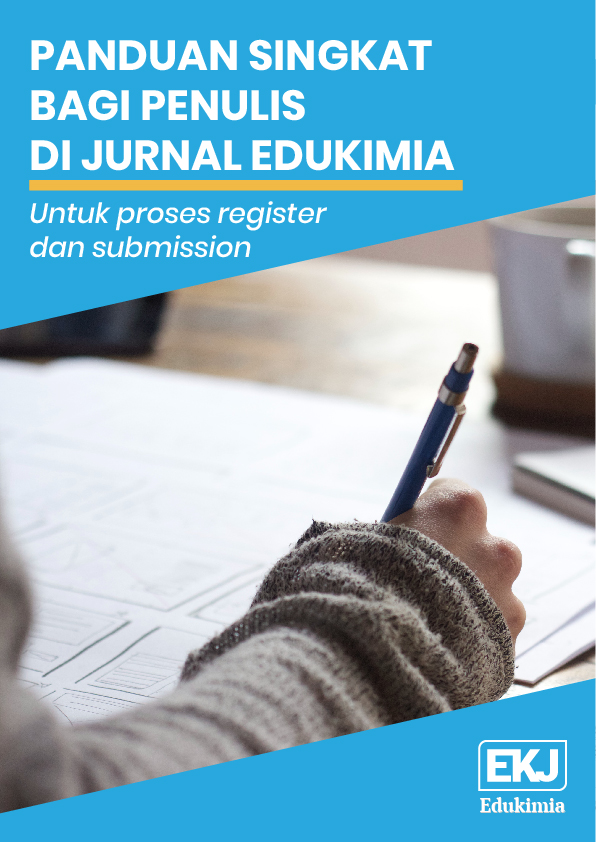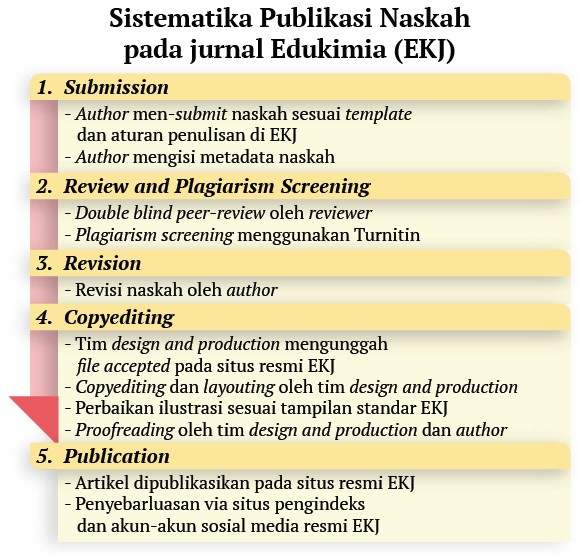Description of Student Learning Outcomes on Chemistry Materials that Implement Chemical Calculations Using Guided-Inquiry-Based Modules
Article Metrics
The abstract has been viewed for 505 times.The full pdf article has been downloaded for 467 times.
Abstract
Keywords
References
Rijani EW. Implementasi Metode Latihan Berjenjang Untuk Meningkatkan Kemampuan Siswa Menyelesaikan Soal-Soal Hitungan Pada Materi Stoikiometri Di SMA. E-Jurnal Dinas Pendidikan Kota Surabaya. 2011;1:1–6.
Sunyono, Maryatun S, Surwati S. Optimalisasi Pembelajaran Kimia Kelas XI Semester 1 SMA Swadhipa Natar Melalui Penerapan Metode Eksperimen Menggunakan Bahan-Bahan Yang Ada Di Lingkungan. Lampung; 2005.
Zakiyah, Ibnu S, Subandi. Analisis Dampak Kesulitan Siswa pada Materi Stoikiometri Terhadap Hasil Belajar Termokimia. EduChemia (Jurnal Kimia dan Pendidikan). 2018;3(1):119–34.
Kimberlin S, Yezierski E. Effectiveness of Inquiry-Based Lessons Using Particulate Level Models to Develop High School Students Understanding of Conceptual Stoichiometry. Journal of Chemical Education. 2016;93(6):1002–9.
Tri Wasonowati RR, Redjeki T, Ariani S. Penerapan Model Problem Based Learning (PBL) Pada Pembelajaran Hukum - Hukum Dasar Kimia Ditinjau Dari Aktivitas Dan Hasil Belajar Siswa Kelas X IPA SMA Negeri 2 Surakarta Tahun Pelajaran 2013 hingga 2014. Jurnal Pendidikan Kimia. 2014;3(3):66–75.
Amilasari A dan S. Peningkatan Kecakapan Akademik Siswa SMA dalam Pembelajaran Fisika Melalui Penerapan Inquiry Terbimbing. Jurnal Pengajaran MIPA FPMIPA UPI. 2008;12(2).
Blanchard MR, Southerland SA, Osborne JW, Sampson VD, Annetta LA, Granger EM. Is inquiry Possible in Light of Accountability?: A Quantitative Comparison of The Relative Effectiveness of Guided Inquiry and Verification Laboratory Instruction. Science Education. 2010;94(4):577–616.
Hanson D. Designing Process-Oriented Guided-Inquiry Activities. 2005;(1995):2–5.
Wahyudi LE, Supardi ZAI. Penerapan Model Pembelajaran Inkuiri Terbimbing Pada Pokok Bahasan Kalor Untuk Melatihkan Keterampilan Proses Sains. Jurnal Nalar Pendidikan. 2017;02(02):62–5.
Vlassi M, Karaliota A. The Comparison between Guided Inquiry and Traditional Teaching Method. A Case Study for the Teaching of the Structure of Matter to 8th Grade Greek Students. Procedia - Social and Behavioral Sciences. 2013;93:494–7.
Rusche, S. N and Jason K. You Have to Absorb Yourself in it: Using Inquiry and Reflection to Promote Student Learning and Self-knowledge. American Sociological Association. 2011;39(4).
Andromeda, Ellizar, Iryani, Yerimadesi, Rahmah F. The Effectiveness of Guided Inquiry Based Colloid System Modules Integrated Experiments on Science Process Skills and Student Learning Outcomes. Journal of Physics: Conference Series. 2019;1317(1).
Hidayat T, Andromeda. Efektivitas Penggunaan Modul Laju Reaksi Berbasis Inkuiri Terbimbing Terintegrasi Eksperimen Untuk Meningkatkan Hasil Belajar Siswa. Journal of Residu. 2019;3(13):69–76.
Pratiwi I, D RE, Silaban R, Suyanti RD. Pengembangan Modul Berbasis Inkuiri Terbimbing Pada Materi Hukum Dasar Kimia Di Sekolah Menengah Atas. Talenta Conference Series: Science and Technology (ST). 2019;2(1):187–93.
Pahriah. Pengaruh Pendekatan Inkuiri Terbimbing dipadu dengan Diagram Alir terhadap Prestasi Belajar Siswa SMA. Prisma Sains : Jurnal Pengkajian Ilmu dan Pembelajaran Matematika dan IPA IKIP Mataram. 2015;3(2):59.
Awaliyah N. Keefektifan DSLM Untuk Meningkatkan Pemahaman Konsep Mahasiswa Terhadap Materi Hidrolisis Garam. In: Seminar Nasional Pendidikan Biologi dan Saintek II. 2017. hal. 557–70.
Maratusholihah, N., Rahayu, Sri., Fajaroh F. Analisis Miskonsepsi Siswa SMA Pada Materi Hidrolisis Garam dan Larutan Penyangga. Jurnal Pendidikan. 2017;2(7).
Sukardi. Metodologi Penelitian Pendidikan: Kompetensi dan Praktiknya. Jakarta: Bumi Aksara; 2008.
Snyder H. Literature review as a research methodology: An overview and guidelines. Journal of Business Research. 2019;104(July):333–9.
Andromeda, Iryani, Ellizar, Yerimadesi, Sevira WP. Effectiveness of Chemical Equilibrium Module Based Guided Inquiry Integrated Experiments on Science Process Skills High School Students. Journal of Physics: Conference Series. 2019;1185(1).
Sudigdo A dan Perdana R. The Development of Chemistry Teaching Module SMA atau MA Based Guided Inquiry to Improve Students Achievement on Hydrolisis Salt Content. Journal of Xi-an University of Architecture and Technology. 2020;XII(V):1300–9.
Iryani, Fitriza Z, Iswendi, Bayharti, Yunisa W, Ifelicia P. Development of Buffer Solution Module Based on Guided Inquiry and Multiple Representations. Journal of Physics: Conference Series. 2019;1317(1).
Depdiknas. Penulisan Modul. 2008.
Puspitasari AD. Penerapan Media Pembelajaran Fisika Menggunakan Modul Cetak dan Modul Elektronik pada Siswa SMA. Jurnal Pendidikan Fisika. 2019;7(1):17–25.
Bayharti, Azumar OR, Andromeda, Yerimadesi. Effectiveness of Redox and Electrochemical Cell Module Based Guided Discovery Learning on Critical Thinking Skills and Student Learning Outcomes of High School. Journal of Physics: Conference Series. 2019;1317(1).
Kuhlthau CC. Guided Inquiry: School Libraries in the 21 st Century. School Libraries Worldwide. 2010;16(1):17–27.
Douglas EP, Chiu C-C. Process-oriented Guided Inquiry Learning in Engineering. Procedia - Social and Behavioral Sciences. 2012;56(Ictlhe):253–7.
Koksal EA, Berberoglu G. The Effect of Guided-Inquiry Instruction on 6th Grade Turkish Students Achievement, Science Process Skills, and Attitudes Toward Science. International Journal of Science Education. 2014;36(1):66–78.
Barthlow MJ, Watson SB. The Effectiveness of Process-Oriented Guided Inquiry Learning to Reduce Alternative Conceptions in Secondary Chemistry. School Science and Mathematics. 2014;114(5):246–55.
Devi, Arpiana dan Mukhamad N. Efektivitas Penggunaan Model Pembelajaran POGIL untik Menurunkan Miskonsepsi Siswa Kelas XI MIPA 5 Di SMA Negeri 4 Samarinda Pada Pokok Bahasan Hidrolisis Garam. Jurnal Zarah. 2020;8(1):38–43.
Refbacks
- There are currently no refbacks.

.jpg)


